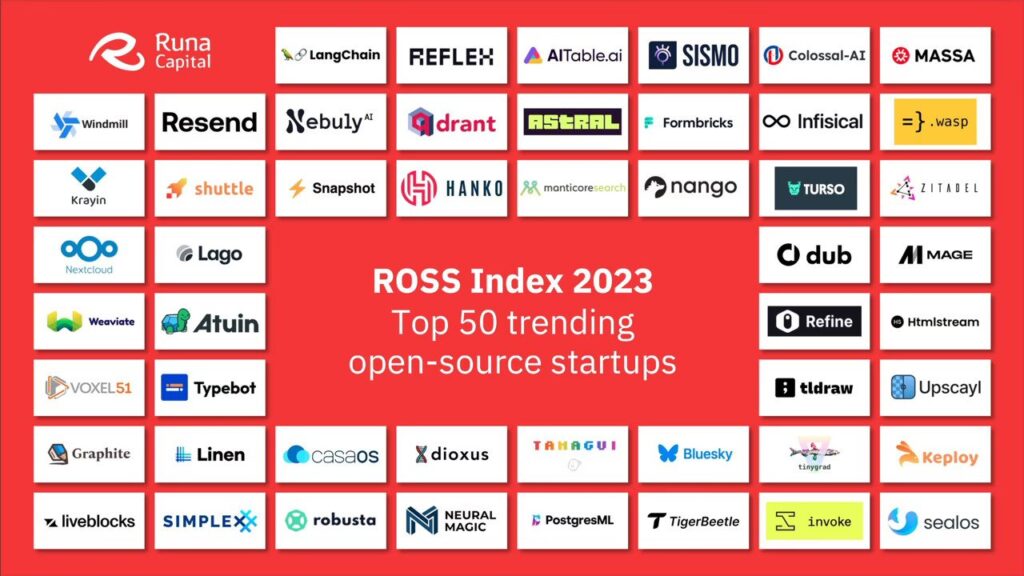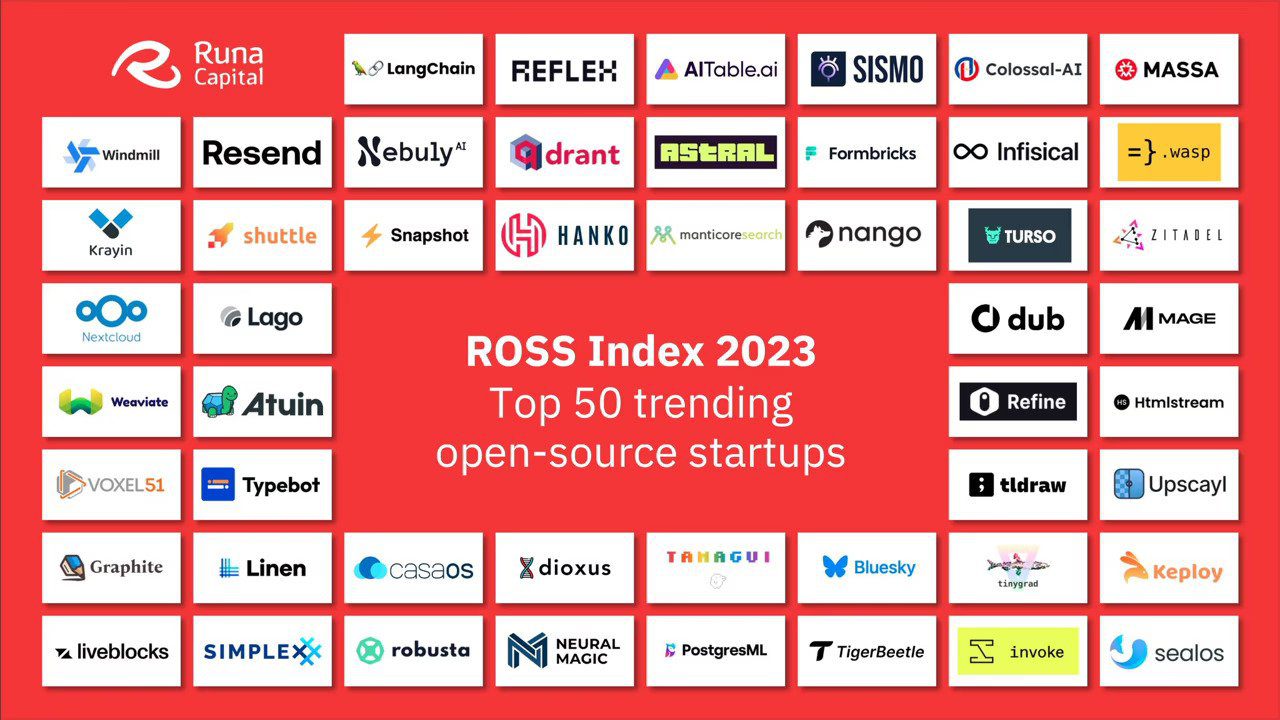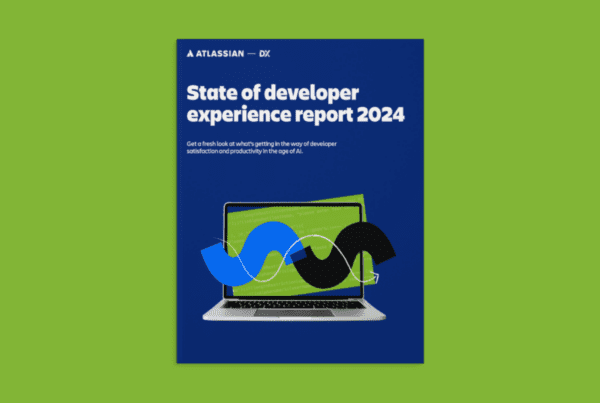A new report by Runa Capital, a venture capital firm that recently moved its headquarters to Luxembourg, highlights the surging demand for startups building open source tools and technologies to support the rapidly growing AI revolution. Runa Capital’s yearly Runa Open Source Startup (ROSS) Index unveils the 50 hottest open-source startups, ranked by the explosive growth of their GitHub star count over the past year. This year’s report reveals that more than half of the top 50 trending open source startups are focused on AI and data infrastructure.
In this article we review key findings,….
🥇 LangChain Leads the Pack
Topping the ROSS Index for 2023 is LangChain, a San Francisco-based startup that has developed an open source framework for building apps based on large language models (LLMs). With over 72,500 GitHub stars and a recent $25 million Series A led by Sequoia, LangChain is at the forefront of the AI revolution.
The company’s success highlights the growing demand for tools that make it easier for developers to harness the power of LLMs and create intelligent applications. As more businesses seek to integrate AI into their products and services, startups like LangChain are well-positioned to capitalize on this trend.

ROSS Index 2023: Top 50 trending open-source startups (Source: Runa Capital)
🔝 Other Notable Startups in the Top 20
- Reflex: An open source framework for creating web apps in pure Python, Reflex recently secured a $5 million seed investment, validating its potential to streamline web development.
- AITable: This spreadsheet-based AI chatbot builder is reminiscent of an open source Airtable competitor, showcasing the growing interest in accessible AI tools for non-technical users.
- Sismo: Focusing on privacy, Sismo allows users to selectively disclose personal data to applications, addressing a key concern in the age of AI and big data.
- HPC-AI: With ambitions to become the OpenAI of Southeast Asia, HPC-AI is building a distributed AI development and deployment platform, underscoring the global nature of the AI race.
- Qdrant: The open source vector database recently secured $28 million in funding, highlighting the crucial role of data infrastructure in the AI ecosystem.
- Massa: This French startup is working on a cryptocurrency ecosystem designed for mass adoption, using Blockclique architecture to enable thousands of transactions per second while maintaining security and decentralization.
- Formbricks: Hailing from Germany, Formbricks is an open-source micro-survey solution that enables users to gather feedback during the customer journey.
- Wasp: Developed in Croatia, Wasp is an open-source, declarative domain-specific language (DSL) for developers who want to use the modern web dev stack (React, Node.js, Prisma) without writing boilerplate code.
- Shuttle: Based in the UK, Shuttle is an open-source cloud platform for developing and deploying apps with minimal infrastructure hassle, boasting deploy times reduced from minutes to milliseconds.
- Hanko: Another German startup, Hanko builds open-source, customizable web components pre-built for all authentication use cases, which can be easily integrated into any web app.
These startups demonstrate the diverse range of innovations emerging from the open-source community, spanning AI, data infrastructure, web development, cryptocurrency, user feedback, and authentication.
🌍 Global Trends and Insights
The ROSS Index provides valuable insights into the geographic distribution of open source startups. While 26 companies on the list have headquarters in the U.S., 10 of these originated elsewhere and still have founders or employees based in other countries. This trend underscores the global nature of the open source community and the ability of startups to attract talent from around the world.
Europe is emerging as a key player in the open source startup scene, with France boasting the most COSS startups (seven), including Sismo and Massa in the top 10. The U.K. has also seen impressive growth, jumping from just one startup in 2022 to six in 2023. This surge in European representation suggests that the continent is becoming an increasingly attractive hub for open source innovation.
Konstantin Vinogradov, Runa Capital’s London-based general partner, explains the appeal of the U.S. for many open source startups:
“Open source startups often prefer to set up their key entity where most of their future customers and investors are located. This makes incorporating in the U.S. the standard choice in the West, due to its speed, low cost, English language, broad set of tools, such as stock options and SAFEs, and large addressable market.”
However, with the rise of remote work and the growing prominence of European tech hubs, this trend may gradually shift in the coming years.
🏆 Programming Language Popularity
The ROSS Index also sheds light on the programming languages favored by top open source startups. TypeScript, a JavaScript superset developed by Microsoft, remains the most popular, used by 38% of the top 50 companies. This dominance highlights the importance of web technologies and the growing adoption of TypeScript for its enhanced type safety and developer productivity.
Python and Rust have seen increased adoption, reflecting their popularity in the AI and systems programming communities, respectively. On the other hand, Go and JavaScript usage has declined, possibly indicating a shift towards more specialized languages for certain use cases.

ROSS Index 2023: Top programming languages (Source: Runa Capital)
🔍 Methodology and Context
To fully appreciate the insights provided by the ROSS Index, it’s essential to understand the methodology behind the rankings. To be considered, a startup must have at least 1,000 GitHub stars and be founded within the last 10 years with less than $100 million in known funding.
However, the ROSS Index adopts a particularly liberal interpretation of “open source,” including companies with restrictive licenses like the Business Source License (BSL) and Server Side Public License (SSPL). This approach focuses on the “commercial perception of open source” rather than the strict definition set by the Open Source Initiative.
As Vinogradov explains, “Such licenses maintain the OSS spirit — all its freedoms, except for slightly limited redistribution, which does not affect developers but grants original vendors a long-term competitive edge. From a VC perspective, it is just an evolved playbook for exactly the same type of companies. The open source definition applies to software products, not companies.”
This nuanced approach allows the ROSS Index to capture a broader range of startups that are leveraging open source principles to drive innovation and growth.
💸 Funding and Growth
The top 50 ROSS Index participants collectively gained 12,000 contributors in 2023, and their overall GitHub star count increased by nearly 500,000. This impressive growth demonstrates the vitality of the open source startup ecosystem and the increasing interest from developers worldwide.
The companies featured across all ROSS Indexes have raised a combined total of $2.7 billion. Moreover, funding into these startups hit $513 million last year, a 32% increase from 2022 and a staggering 145% increase from 2021. This surge in investment underscores the confidence of investors in the potential of open source startups to drive innovation and disrupt established industries.
As the AI revolution continues to reshape the tech landscape, open source startups are poised to play a crucial role in democratizing access to cutting-edge technologies and enabling businesses of all sizes to harness the power of AI and data infrastructure.
🔮 Future Predictions
Looking ahead, experts predict that the open source startup ecosystem will continue to thrive, driven by the rapid advancement of AI technologies and the growing demand for accessible, flexible, and cost-effective solutions.
As more businesses seek to integrate AI into their operations, the need for open source tools and frameworks will only increase. This trend is likely to fuel further growth and innovation among open source startups, as well as attract more investment from VCs and strategic partners.
Moreover, the global nature of the open source community suggests that we may see the emergence of new startup hubs around the world, as talented developers and entrepreneurs collaborate across borders to build the next generation of AI and data infrastructure solutions.
However, challenges remain, particularly around the sustainability and monetization of open source projects. As startups navigate the balance between community-driven development and commercial success, new business models and licensing approaches may emerge to ensure the long-term viability of open source innovation.
Ultimately, the future of open source startups looks bright, as they continue to push the boundaries of what’s possible with AI and data infrastructure. By democratizing access to these powerful technologies, these startups are helping to create a more inclusive and innovative future for businesses and developers worldwide.
#OpenSource #AI #Startups #Innovation #Funding #Future



